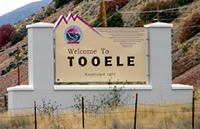Another waste site for Utah?
10 February 2010
A new waste disposal site was pitched to Utah state officials by Cedar Mountain Environmental yesterday. The facility would ease a shortage in US disposal space for low-level radioactive wastes (LLW).
 |
Cedar Mountain Environmental hopes
tax dollars will make its development
welcome in Tooele County |
The company is proposing a single-cell facility in Tooele County, Utah with capacity to dispose of 13 million cubic yards (10 million cubic meters) of commercial and government LLW from power generation, nuclear research and medical applications. LLW materials are typically lightly soiled plastics, clothing, resins and equipment but also sometimes larger items including components of dismantled nuclear plants.
In a meeting with the Utah Radiation Control Board, the Tooele plan was pitched by Cedar president Charles Judd as a successor to Energy Solutions' current Clive facility, also in Utah. At present, Clive is used to dispose of the vast majority of US commercial nuclear power plant LLW, about 100,000 cubic yards (76,000 cubic meters) per year.
Facilities like this usually take the form of shallow excavated cells, lined with thick long-lasting barriers. Compacted containers of LLW are placed inside and full sections of disposal cells are sealed in with barriers and finally covered by earth.
The Tooele plan, according to Judd, envisages a simple and modern design featuring only one large cell, leading to relatively smaller contaminated areas. It would also allow wastes to be covered more quickly and would feature a radon barrier four feet thick (120 centimeters).
Judd promoted his company's plans as a way for Utah to raise significant funds by suggesting payment levels per unit of waste. A payment to Utah State Institutional Trust would raise "millions" for Utah schools, he said, while $14 million per year in tax would go to the state and $9 million to Tooele county.
Meanwhile, Judd sought favour from board members by declaring the new site would not accept depleted uranium or leftovers from the processing and recycling of waste from other countries, as has proven controversial for Energy Solutions.
Should Cedar be successful in negotiating state and federal requirements, a new LLW facility would be only the fourth in the USA, but the second to accept wastes from the entire country.
US states have formed 'compacts' for LLW management at shared facilities and that has resulted in a fragmented regime for waste disposal. A facility run by Energy Solutions at Barnwell, South Carolina only takes wastes from that state, New Jersey and Connecticut, while one in Richland, Washington run by US Ecology accepts wastes from the Northwest and Rocky Mountain compacts. A new facility should open in Texas later this year operated by Waste Control Specialists and take wastes from Texas and Vermont and well as from federal programs.
At present, only the Clive facility accepts LLW from all across the USA, but Cedar Mountain's plan would see their facility share the same status.
Researched and written
by World Nuclear News